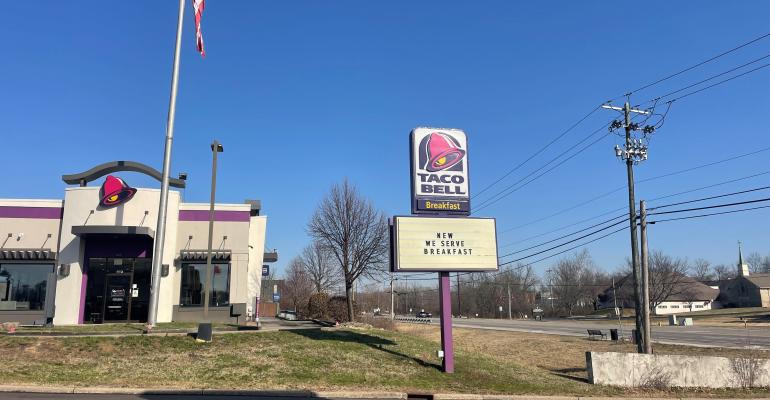It may be too early to call it a full “comeback,” but restaurants are unquestionably becoming more bullish about breakfast four years after the daypart was decimated by pandemic-induced restrictions. Nowhere is that bullishness clearer than at Wendy’s, which is targeting $6,000 in breakfast sales per restaurant per week. Should this goal come to fruition, it would grow the chain’s breakfast sales by 50% throughout the next two years.
Wendy’s push to continue building up its morning business is evident in its persistent innovation here, including a new bacon burrito and a new Cinnabon Pull-Apart. Additionally, the company announced during its earnings call earlier this month that it will invest approximately $55 million in ad dollars toward the daypart.
“This investment will further amplify our plans and support and always-on approach across media partnerships and activations as we tell our breakfast story,” CEO Kirk Tanner told analysts. “The breakfast daypart is one of the most compelling levers when considering sales growth and margin acceleration opportunities.”
Fifty-five million dollars is a big bet on breakfast’s viability and impact, but it’s worth noting that Wendy’s optimism is shared by others. Jack in the Box CEO Darin Harris told analysts last week that breakfast “continues to be an opportunity we are addressing,” adding that the chain is bringing back some items and making the daypart a regular part of the marketing calendar. The chain is also innovating the morning menu with items like Mini Cinnis, and testing new breakfast offers through its digital channels.
“I think (breakfast) is one of the more competitive areas right now that we have to make sure we’re competing heavily in and having the right offerings. So, I think that’s one we have to lean in to and be more aggressive,” Harris said.
Earlier this month, McDonald’s CEO Chris Kempczinski shared this sentiment, stating that “breakfast continues to be a competitive area; a lot of activity going on in breakfast.”
Then there’s Taco Bell, which started resharpening its focus on breakfast last year with a marketing campaign featuring actor/comedian Pete Davidson. In the fall, the chain began testing breakfast tots while (finally) launching breakfast tacos. During a recent interview, Liz Matthews, Taco Bell’s chief food innovation officer, said breakfast is coming back – albeit slowly – and “you’ll see some things over the next year on what we’ll be testing there.”
More of this competitive activity, however, is coming from outside of the quick-service segment than perhaps ever before. A recent report from Technomic examined “what’s in store for 2024,” and the insights company noted QSR breakfast is “in” for 2024, while “its more formal cousin, brunch” is also “in” this year. To understand more about that “formal cousin,” look no further than the recent performance of brunch concept First Watch, which experienced a 22% jump in sales and a 9% increase in unit count from 2021 to 2022, according to Technomic Ignite data. Smaller concepts, like Biscuit Belly, Toasted Yolk, and Another Broken Egg Café, are growing sales and units at an even faster clip.
Another sign of bullishness in this category is Denny’s acquisition of Keke’s Breakfast Café a year and a half ago. At the time, Denny’s CEO Kelli Valade said, “This is an exciting opportunity to participate in the fast-growing A.M. eatery segment through a complementary brand.” Earlier this month, Valade shared that the concept now has 14 signed development agreements for over 100 Keke’s cafés across multiple states.
“The future is bright for a small but mighty Keke’s brand,” she said.
While QSRs recover and recruit new morning customers and the brunch category continues to generate a remarkable amount of interest, it’s best not to count out the traditional full-service breakfast players. Take IHOP, for instance, which has outperformed the broader casual dining category in both sales and traffic the past two years. These results have been driven mostly by its “largest menu evolution ever,” as well as a new biscuit menu, and new waffles. During a recent interview, IHOP CMO Kieran Donahue said the chain’s menu innovation will continue this year.
“You’ll see us leaning into our equities more,” she said.
Of course, IHOP’s equities revolve around breakfast, and 75% of the company’s guests order a breakfast item every time they visit.
“They have given us permission to play around with the menu and find creative ways to innovate within that category and we’ve built a better foundation over the past few years,” she said.
This “permission” may either be for IHOP specifically or for breakfast in general. As they say, a rising tide lifts all boats.
Perhaps the best way to understand the status of the morning daypart is by understanding how consumers are starting their days. Full-service breakfast (including brunch) benefits from travel, and the U.S. Travel Association expects both leisure and business travel to continue increasing this year. QSR breakfast, meanwhile, benefits largely from work commuters and, according to workforce insights platform Aura, there has been a significant decrease – over 20% – in remote job openings over the last six months. So, while estimates show that about 15% of employees work from home full-time, and nearly 30% have a hybrid work model, that number may be changing throughout the next couple of years.
This may be why operators are bullish on breakfast despite traffic declines in recent months. New data from Revenue Management Solutions finds that breakfast traffic fell by 4.3% in January compared to the same period last year. CMO Jana Zschieschang said, however, this drop was likely driven by adverse weather conditions and shouldn’t impact a longer term – sunnier – forecast for breakfast.
“ResumeBuilder found in a survey that 90% of companies will return to the office by 2024,” she said. “As more employees return to the office, breakfast traffic should also grow, particularly compared to past years when fewer companies required staff to be in the office.”
Contact Alicia Kelso at [email protected]





